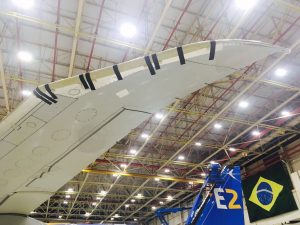An E190-E2 is now flying with simulated ice shapes affixed to several parts of the fuselage that measure the aircraft’s ability to perform in icing conditions. It’s all part of the E2s certification process.
To comply with certification requirements, Embraer uses simulated ice shapes made from composite materials. Those materials are installed on the radome, leading edges of the wings and empennages, and the upper and lower surfaces of the wing. The shapes, determined by wind tunnel tests, numerical calculations and data from natural icing conditions, vary in size depending on their location so that they can more accurately simulate actual ice accretion on each area.

During the test campaign, the E2’s control and maneuverability is monitored during different phases of flight – take off, climb, cruise, descent, holding, landing – and in the case of a failure of the anti-ice system. The aircraft’s envelope protection functionalities are also tested to ensure satisfactory performance during icing conditions.

